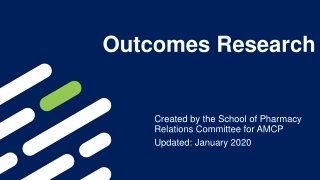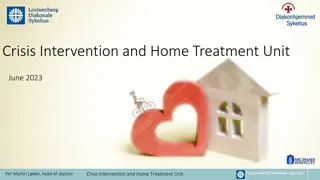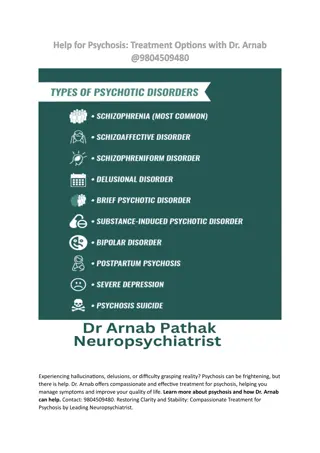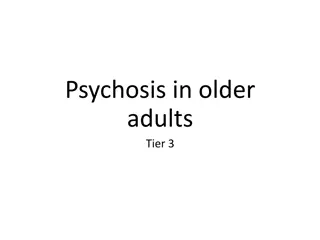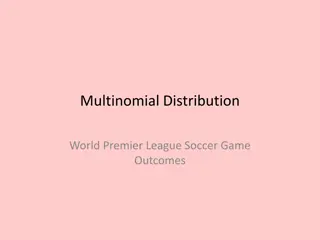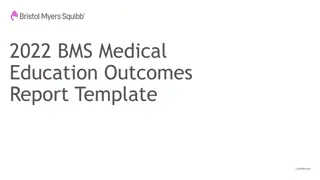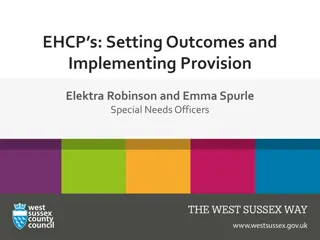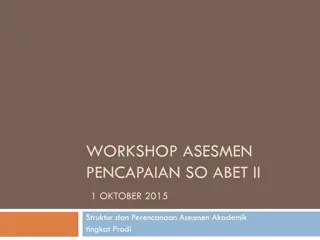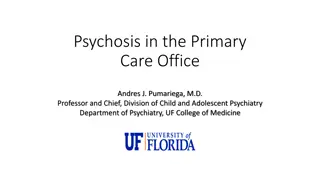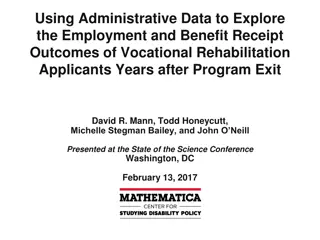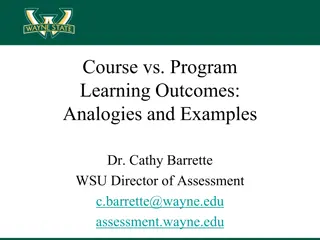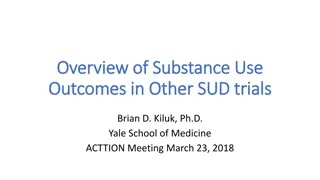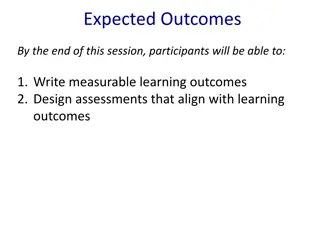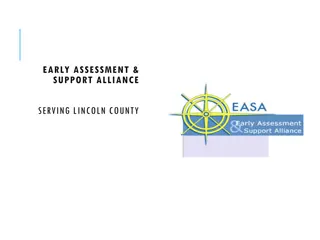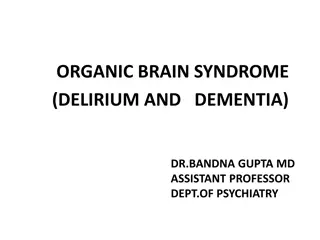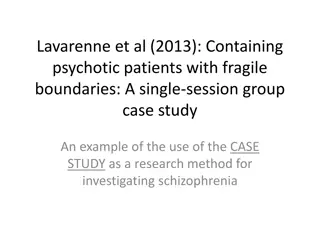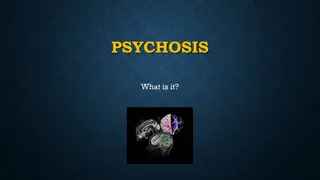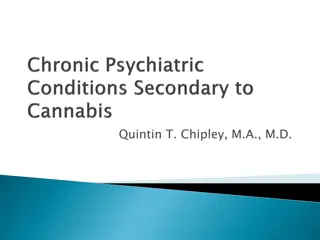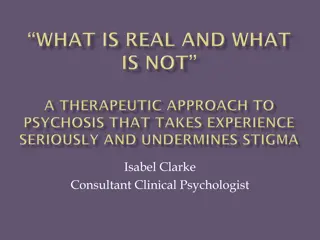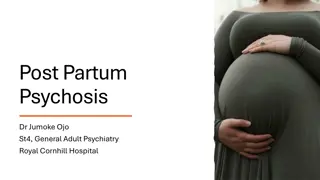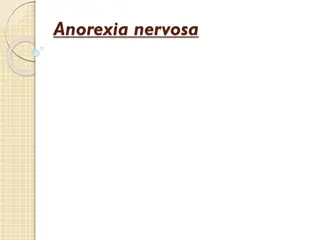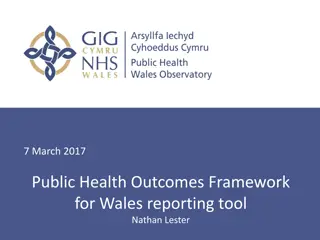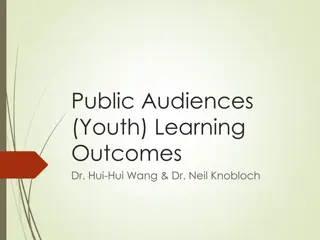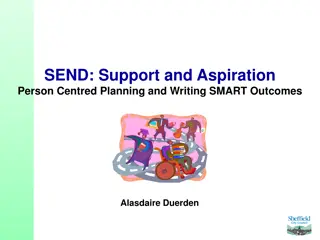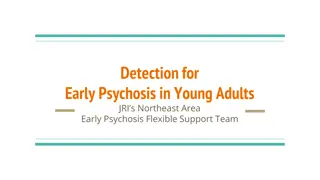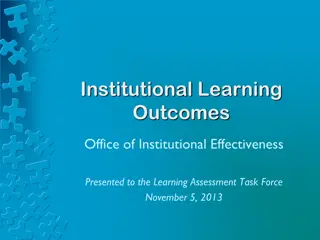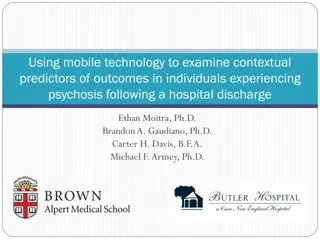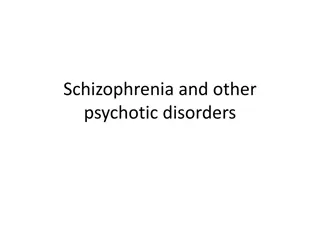Outcomes Research
Explore the definition and importance of outcomes research in managed care, including the tools used to measure clinical, economic, and humanistic outcomes. Discover the role of managed care pharmacists in outcomes research.
3 views • 20 slides
Prioritizing Clinically Important Outcomes Using Hierarchical Win Ratio
Clinical trials often use composite outcomes, but conventional analysis methods have limitations in accurately reflecting clinical reality. Hierarchical outcomes offer flexibility by defining a hierarchy of events based on importance. Analyzing trials using hierarchical outcomes involves comparing p
7 views • 20 slides
Comprehensive Crisis Intervention and Home Treatment Unit Overview
The Crisis Intervention and Home Treatment Unit, led by Per Martin L.ken, offers a variety of services including inpatient clinics, outpatient clinics, community services, and mobile crisis support for individuals facing challenges such as psychosis, suicidal issues, and eating disorders. The unit p
0 views • 7 slides
Help for Psychosis Treatment Options with Dr. Arnab 9804509480
Experiencing hallucinations, delusions, or difficulty grasping reality? Psychosis can be frightening, but there is help. Dr. Arnab offers compassionate and effective treatment for psychosis, helping you manage symptoms and improve your quality of life. Learn more about psychosis and how Dr. Arnab ca
0 views • 2 slides
Understanding Psychosis in Older Adults
Psychosis in older adults presents unique challenges due to varied etiology, different presentations, and higher associated morbidity. Causes include medical conditions, psychiatric disorders, and certain medications. Delirium, depression, and dementia are common contributors to psychosis in the eld
0 views • 12 slides
Understanding Multinomial Distribution in Statistical Analysis
Multinomial Distribution is a powerful tool used in statistical analysis to model outcomes of events with multiple categories. This distribution is applied to scenarios where each trial has several possible outcomes, and the sum of probabilities of all outcomes is equal to 1. By defining random vari
0 views • 8 slides
Comprehensive Medical Education Outcomes Report
This confidential report template outlines key instructions for creating and submitting outcomes reports in the field of medical education. It includes guidelines, slide templates, and specific data requirements for interim and final outcomes findings. The provided information must be accurately inp
0 views • 18 slides
Understanding Psychosis in Older Adults
Psychosis in older adults involves a loss of contact with reality, including hallucinations and delusions. Symptoms vary but can include disordered thoughts, behaviors, and negative symptoms. It is common in older adults and can have various causes, such as delirium, mood disorders, dementia, and su
0 views • 10 slides
Principles of Integrated Design and Alignment in Course Development
Explore the significance of alignment in course and assessment design, program development factors, defining learning outcomes, designing assessments, and the interconnection between outcomes, tasks, feedback, and grading. Understand how integrated design shapes teaching and learning processes suppo
0 views • 23 slides
Understanding Course Outcomes and Program Attainment in Engineering Education
Graduates of engineering programs in India are required to attain Program Outcomes (POs) identified by the National Board of Accreditation (NBA) through courses, projects, and activities. Course Outcomes (COs) define what students should be able to do at the end of a course and play a crucial role i
0 views • 63 slides
Understanding EHCP Outcomes and Provision for Special Educational Needs
EHCP outcomes and provision for special educational needs are crucial components outlined in a child or young person's Education, Health, and Care Plan (EHCP). Long-term outcomes are categorized into learning areas, while medium-term outcomes serve as steps towards achieving long-term goals. It is i
0 views • 15 slides
Understanding Maternal Mental Health Complications
Maternal mental health complications, including postpartum depression and psychosis, can have a significant impact on both the mother and child's well-being. Factors such as stigma, culture, trauma, and lack of support systems can exacerbate these conditions. Early detection and intervention are cru
0 views • 12 slides
Harnessing Syndromic Surveillance Systems for Climate-Related Outcomes
Utilizing syndromic surveillance systems can provide valuable insights into the impact of climate change on health outcomes. This document aims to guide users on identifying outcomes, creating case definitions, combining data sources, and engaging with partners for effective climate and health surve
1 views • 28 slides
Cognitive Behavioral Therapy for Psychosis: Concepts and Applications
Explore the foundational principles of Cognitive Behavioral Therapy (CBT) for psychosis, emphasizing how thoughts influence feelings and behaviors. Gain insights into the cognitive-behavioral model of paranoia and learn about the main tenets of CBTp. Discover how CBTp can effectively address psychot
0 views • 63 slides
Risks and Health Impact of Edible Cannabis Consumption in Young People
Edible cannabis products, such as sweets and drinks, pose serious risks to young individuals due to their resemblance to regular sweets, delayed onset of effects, and potential for overdose. Consumption of these products can result in health issues like increased heart rate, cognitive impairment, ps
0 views • 10 slides
Exploring Stigma in Early Detection of Psychosis Among Young People
This research focuses on stigma associated with identifying at-risk individuals for psychosis. It delves into the impact of societal perceptions on mental health outcomes, presenting findings from studies on public stigma, discrimination, and self-stigma. The study also examines how cultural factors
0 views • 46 slides
Effective Mapping Strategies for Aligning Student Learning Outcomes (SLOs) with Program Learning Outcomes (PLOs)
Explore effective strategies for aligning Student Learning Outcomes (SLOs) with Program Learning Outcomes (PLOs) to enhance PLO assessment. Understand the connection between PLOs and SLOs as key elements in the education mapping process. Discover top-down and bottom-up approaches to strategically ma
1 views • 13 slides
Academic Assessment Workshop on Program Educational Objectives and Student Outcomes
Understanding the significance of Program Educational Objectives (PEO) and Student Outcomes (SO) in academic assessment. PEO outlines career achievements while SO specifies knowledge and skills expected from graduates. Explore the anatomy of PEO, ABET Student Outcomes, and Program Specific Outcomes
0 views • 58 slides
Understanding Psychotic Symptoms in Children and Youth
Psychotic symptoms in children and youth can manifest in various forms including hallucinations, grief-related apparitions, cultural influences, hypnagogic experiences, and imaginary friends. It's important to differentiate between non-pathological experiences and clinical psychosis. Psychotic sympt
0 views • 15 slides
Exploring Long-Term Employment Outcomes of Vocational Rehabilitation Applicants
This study utilized linked administrative data to examine the outcomes of Vocational Rehabilitation (VR) applicants up to 7 years after program exit. Findings showed varied outcomes based on employment status at closure, with better results for those who closed with employment. The research linked R
0 views • 20 slides
Understanding Learning Outcomes: Analogies and Examples
Explore the concept of learning outcomes through analogies with salads and maps. Learning outcomes are specific, measurable statements of what students should know or be able to do after completing a program. Discover how outcomes differ at various organizational levels and how course outcomes contr
0 views • 10 slides
Alcohol Use Outcomes in Substance Use Disorder Trials
This presentation provides an in-depth overview of assessing alcohol use outcomes in substance use disorder (SUD) trials. It covers various assessment methods, common outcomes like percent days abstinent and heavy drinking days, preferred outcomes such as percentage of heavy drinking days (PHDD), an
0 views • 19 slides
Effective Design of Learning Outcomes and Assessments
This session covers writing measurable learning outcomes, designing assessments aligning with outcomes, creating assessments for specific outcomes, analyzing assessments to determine intended learning outcomes, and the importance of clarifying expectations for students and instructors through learni
0 views • 16 slides
Early Assessment & Support Alliance for Mental Health in Lincoln County
Providing comprehensive mental health support through the Early Assessment & Support Alliance (EASA) for young individuals at risk of psychosis or experiencing early symptoms. The team consists of professionals offering services ranging from counseling to case management. Promoting mental well-being
0 views • 22 slides
Understanding Organic Brain Syndrome & Delirium
Overview of organic brain syndrome and delirium, including definitions, clinical features, and management. Delirium, a common psychiatric syndrome, affects consciousness, cognition, and perception, leading to increased morbidity and mortality. Recognize core symptoms, such as disturbances in conscio
0 views • 37 slides
Investigating Schizophrenia Through Group Therapy: A Case Study
This case study explores how group therapy sessions can provide firm boundaries to individuals with weak ego boundaries, aiming to moderate psychotic angst. The research delves into the therapeutic actions of a long-running group in dealing with psychosis and psychological crises. Through coding of
0 views • 19 slides
Understanding Psychosis: Symptoms, Causes, and Impact
Psychosis is a condition where an individual experiences hallucinations, delusions, and changes in behavior and communication. It can be caused by various factors such as trauma, drug use, and poor mental health. Distinguishing between psychotic experiences and a psychotic disorder is crucial in pro
0 views • 19 slides
Understanding Psychotic Disorders and Cannabis Effects
Quintin T. Chipley, M.A., M.D., discusses the impact of cannabis on psychotic disorders, highlighting studies linking cannabis use to increased risk of psychosis. The presentation delves into the dose-dependent and age-dependent effects, the role of THC and Cannabidiol in mind-altering experiences,
0 views • 17 slides
Understanding Unshared Realities in Mental Health Recovery
Exploring the limitations of the illness model in mental health recovery, this content delves into the importance of acknowledging trauma, adversity, and social constructions in psychosis. It discusses the interplay between Emotion Mind and Reasonable Mind, emphasizing the need to validate experienc
0 views • 23 slides
Managing Postpartum Psychosis: A Case Study
Cynthia, a new mother, believes her baby, Damien, is possessed by the devil. She expresses delusions and hallucinations, prompting concern for postpartum psychosis. Her history, symptoms, and risk factors need careful evaluation by a psychiatrist to ensure proper management.
2 views • 13 slides
Understanding Anorexia Nervosa, Bulimia Nervosa, and Post-Partum Psychiatric Disorders
Anorexia nervosa is characterized by significant weight loss, fear of gaining weight, and disturbed body image. It predominantly affects women in adolescence, often associated with dieting and harmful behaviors. Diagnosis involves criteria such as weight loss and amenorrhea. Complications include em
0 views • 14 slides
Public Health Outcomes Framework for Wales Presentation Overview
This presentation provides an in-depth look at the Public Health Outcomes Framework (PHOF) for Wales, outlining its structure, key indicators, and overarching outcomes. The framework encompasses 13 outcomes across 3 domains, with a focus on promoting public health and addressing social determinants.
0 views • 21 slides
Understanding Public Audiences Learning Outcomes for Youth
Delve into the world of public audiences and youth learning outcomes to uncover the impacts intended for projects and programs. Explore how to craft effective learning outcome statements, identify where to find learning outcomes, and discover different categories of learning outcomes expressed as kn
0 views • 18 slides
Enhancing Person-Centred Planning and Writing SMART Outcomes in Sheffield City Council
Explore Sheffield City Council's commitment to person-centred planning and SMART outcomes for individuals with special educational needs and disabilities (SEND). Discover the focus on early identification, transparent information, and improved life outcomes through greater choice and control. Learn
0 views • 23 slides
Understanding Mental Health Continuum and Stress Management Strategies
Explore the various aspects of mental illness as a continuum, including psychosis and depression, along with optimal stress management techniques. Learn about the positive and negative effects of stress, symptoms of psychosis, and strategies for maintaining mental well-being.
0 views • 11 slides
Understanding Psychosis in Young Adults
Psychosis is a mental health condition that can affect young adults and involves a loss of contact with reality. Early detection is crucial for effective treatment. Young adults experiencing psychosis may face obstacles to getting appropriate care, such as social stigma, lack of awareness, and trans
0 views • 15 slides
Mesa Institutional Learning Outcomes Overview
Mesa's Institutional Learning Outcomes (ILOs) focus on core values such as communication, critical thinking, global awareness, personal awareness, civic responsibility, self-awareness, interpersonal skills, and technological awareness. These outcomes are designed to guide students in acquiring essen
0 views • 13 slides
Contextual Predictors of Psychosis Outcomes Post-Hospital Discharge
This study explores predictors of outcomes in individuals with psychosis post-hospital discharge using mobile technology. It addresses treatment nonadherence, the impact of antipsychotics, psychological flexibility, and the use of ecological momentary assessment (EMA). The research highlights the cr
0 views • 27 slides
Understanding Methamphetamine: Effects, Risks, and Harm Reduction
Methamphetamine, also known as meth, crystal meth, or ice, is a potent central nervous system stimulant with short-term effects like euphoria and rapid breathing and long-term risks such as tooth decay and psychosis. This drug is addictive and carries various health hazards, including overdose and H
0 views • 8 slides
Understanding Schizophrenia and Psychosis: A Comprehensive Overview
Schizophrenia and psychosis are mental health disorders characterized by distortions of thinking, perception, and inappropriate emotions. While psychosis is a symptom, schizophrenia is a specific diagnosis that includes symptoms like hallucinations, delusions, and cognitive deficits. Learn about the
0 views • 46 slides
